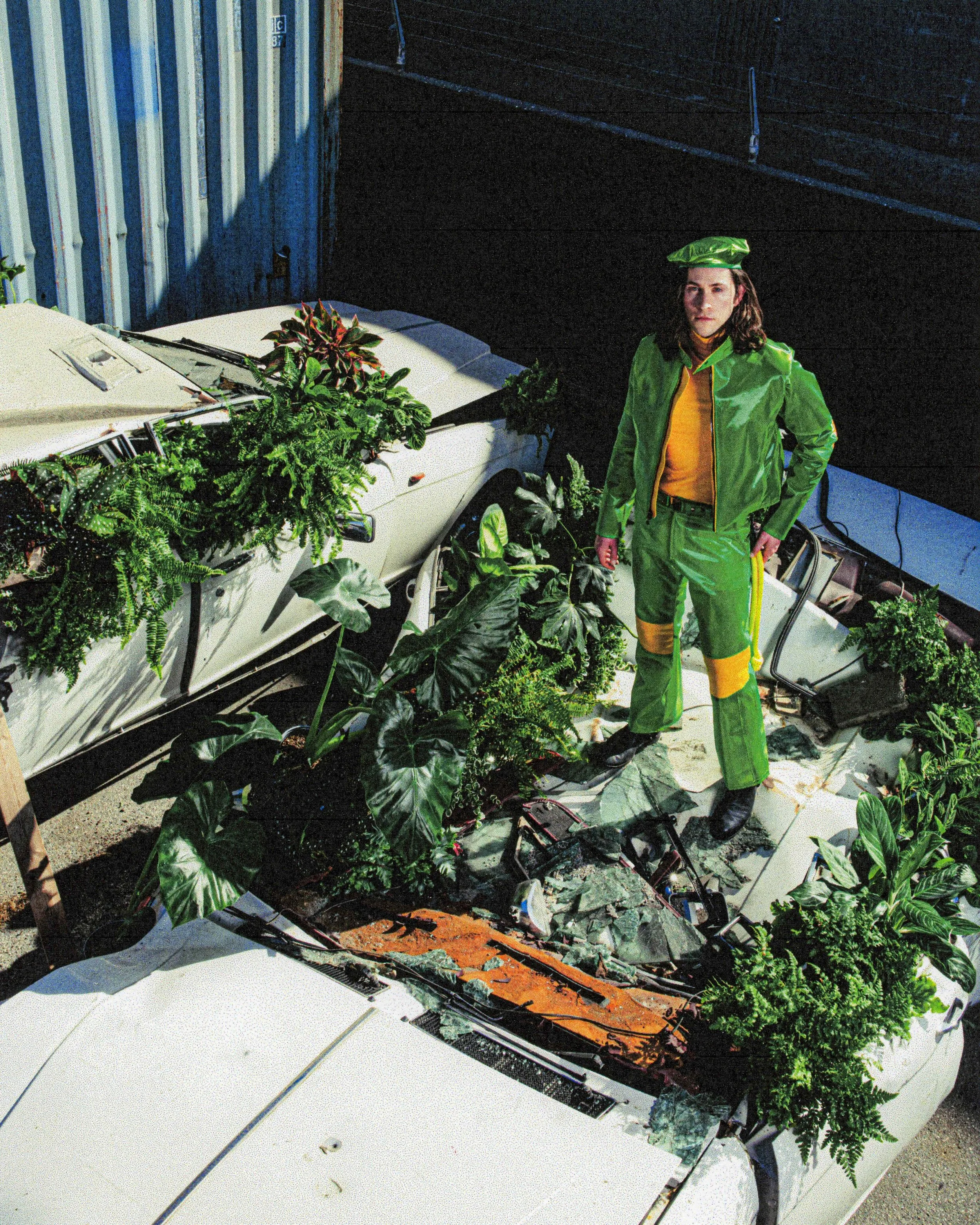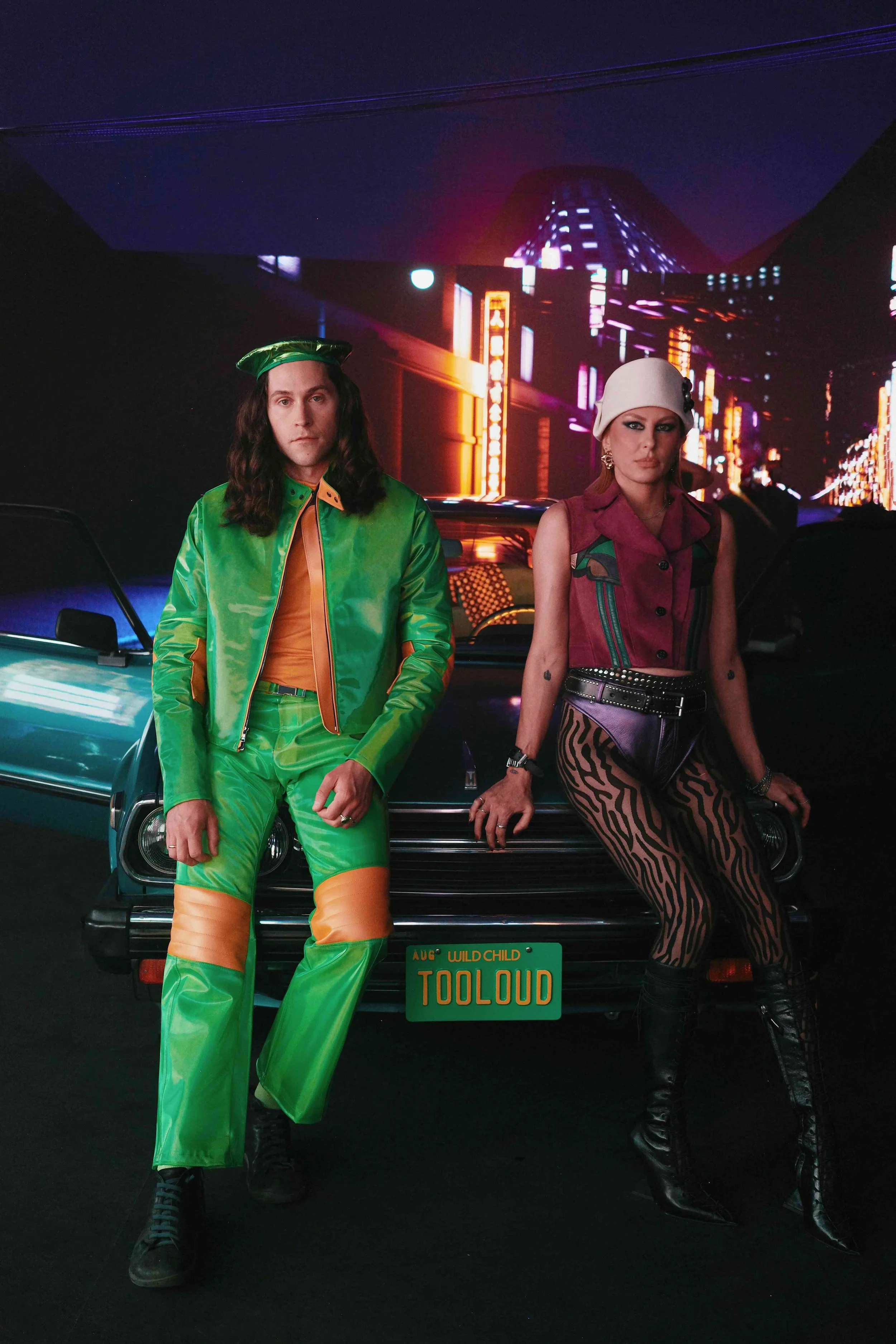Q&A: Big Wild Embraces Freedom and Playfulness on ‘Wild Child’
INTERVIEW
INTERVIEW
WHEN JACKSON STELL BEGAN WORKING ON THIS THIRD ALBUM AS BIG WILD - he realized something crucial was missing: joy. After the heady conceptual heights of 2022’s The Efferusphere, Stell found himself taking the creative process so seriously that it dulled the spark that first drew him to music. Determined to reconnect with that sense of wonder, he imagined a superhero alter ego—Wild Child—to help him embrace curiosity, spontaneity, and childlike exuberance once again. That vision became the guiding force behind Wild Child, his most fearless and unguarded release to date.
Primarily written and produced by Stell alongside a close-knit group of collaborators, the album is a vibrant odyssey that fuses euphoric dance, psychedelic pop, cinematic flourishes, and the colorful textures of 1960s pop. Throughout, Stell balances playful instinct with seasoned artistry, allowing the songs to feel expansive yet deeply personal. Tracks like the symphonic anthem “You Belong Here” and the funky, Phantogram-assisted single “Too Loud” highlight both his eclecticism and his openness to collaboration, while lyrics rooted in natural imagery and spiritual renewal echo his long-standing reverence for the earth.
At its core, Wild Child is a reminder of the freedom found in letting go - of control, of ego, of fear - and creating from a place of curiosity. In channeling his inner child, Stell has crafted an album that is both bold and tender, filled with exuberant soundscapes and a call to reconnect with the rhythms of the world around us. As he prepares to bring these songs to life on his fall Wild Child Tour, Big Wild invites listeners to embrace play, presence, and wonder right alongside him.
LUNA: Your new album Wild Child is officially out. What does this record represent for you compared to your past work?
BIG WILD: Wild Child represents a reset in my creative process in hopes that the outcome would be different, and I think that happened. I tried creating on a more intuitive level where I might not understand exactly where things are going but I trust the excitement and inspiration I’m feeling. I also wanted to be more collaborative so I worked with more songwriters and lyricists. Making this music was a really fun journey.
LUNA: The album title doubles as the name of your imagined superhero alter ego. Who is “Wild Child” to you, and how did that idea shape the music?
BIG WILD: Wild Child is my inner child superhero. I came up with the idea after I had made almost all of the music and realized that working on an intuitive level was largely embracing my inner child—the curious, open minded, and unique part of myself. Wild Child is there to defend the inner child against a culture that promotes its repression. I find I’m the most creative when I live my life with both the inner child and my “inner adult” in balance.
LUNA: After the conceptual scope of The Efferusphere, you’ve said you wanted something more instinctual. What moments during the making of Wild Child felt the most freeing or unfiltered?
BIG WILD: I wanted to let go of most of my control during the genesis of all of these songs. They all originated from a free place. I tried to keep that “loose” mindset as long as I could while holding off the analytical part of the process. I’ve learned that bringing the thinking mind too early in the process of creating really inhibits the song and makes the whole process much more arduous.
LUNA: How did you approach blending so many sonic elements into one cohesive body of work?
BIG WILD: A part of me always worries that my music is too all over the place to be cohesive, but ultimately as long as it makes sense to me I’ll move forward with it. I listen to a lot of different styles of music and I’m always looking for something that sounds fresh to my ears. I only like finishing the song ideas that sound unique from the beginning. I also find joy in balancing all of the elements until they fit together. Maybe one day I’ll be more minimal…
LUNA: “Too Loud” with Phantogram is such a dynamic lead single. How did that collaboration come together, and why was it the right song to introduce this new era?
BIG WILD: I had that demo since The Efferusphere days and I kept coming back to it. Once I committed to finishing it, I knew the song needed another singer and Nate Albert, the head of Giant, my record label, thought Sarah from Phantogram would be a great fit. She ended up being super into the track and absolutely nailed the vibe. It was a pleasure working with her. “Too Loud” is one of the more straightforward singles of the album so I thought it was a good way to introduce the world of Wild Child to people.
LUNA: You’ve drawn inspiration from colorful 1960s pop and your connection to the natural world. What role do those influences play in the stories you’re telling on this album?
BIG WILD: I love the uniqueness of pop music from the 1960’s and wanted to embody that bold spirit with Wild Child. I tried embracing the over-the-top and experimental with my production, and let the lyrics be more fantastical and abstract. The natural world however helps me keep things grounded at the same time. I treat my productions as ecosystems, which despite having a lot of different elements, work together in harmony. This also helps me keep my lyrics rooted in personal experience no matter how imaginary they eventually get.
LUNA: There’s a spiritual undercurrent to these songs, with imagery of balance, renewal, and vulnerability. What personal experiences informed that lyrical direction?
BIG WILD: All sorts of influences from my life come into play like my relationship with my partner, philosophy, the environment, etc. Often I can’t pinpoint exactly where an idea is coming from but there is one song I can. I read a book called Entangled Life: How Fungi Make Our Worlds by Merlin Sheldrake and I began viewing the world differently. It became apparent that we’re not just connected but also growing and replicating in this giant cyclical process. From the cellular level to the level of organisms, the living world keeps churning forward, morphing, and intermingling with itself. This inspired “Earth Orgy.”
LUNA: You’ve talked about reconnecting with the joy and wonder that first sparked your love of music. What does that look like in practice—whether in the studio, on stage, or just in everyday life?
BIG WILD: This practice best works for me in the studio. I’ll explore sounds, mess around on the keyboard, and record something that sounds interesting and exciting to me. Then it’s off to the races, no questions asked. For me, this part has been crucial to re-learn because I had developed a habit of controlling and trying to understand what I’m doing way too early in the process which brings in the analytical mind. While useful later on in the songwriting process, analyzing a song too early prevents the unique connections from forming in the music. Often, you’ll be left with a song that sounds more contrived, unoriginal, and less passionate. Instead, by letting the unconscious flow, we often create something we couldn’t consciously come up with. And no matter the emotion of the song, even something rather depressing, there is joy from the expression.
LUNA: With a fall tour on the horizon, how are you envisioning these new songs translating live?
BIG WILD: These songs are going to be so much fun to perform live. I’ve been working them into the set the last few weeks and really noticed how many opportunities there are for unique moments. They lend themselves to experimentation which is always a positive.
LUNA: What do you hope fans take away from the Wild Child experience?
BIG WILD: I hope it inspires someone to get in touch with their inner child a little more. Spend a little more time during the day being curious and open. But, of course, the experience isn’t up to me, so whatever comes out, comes out!



